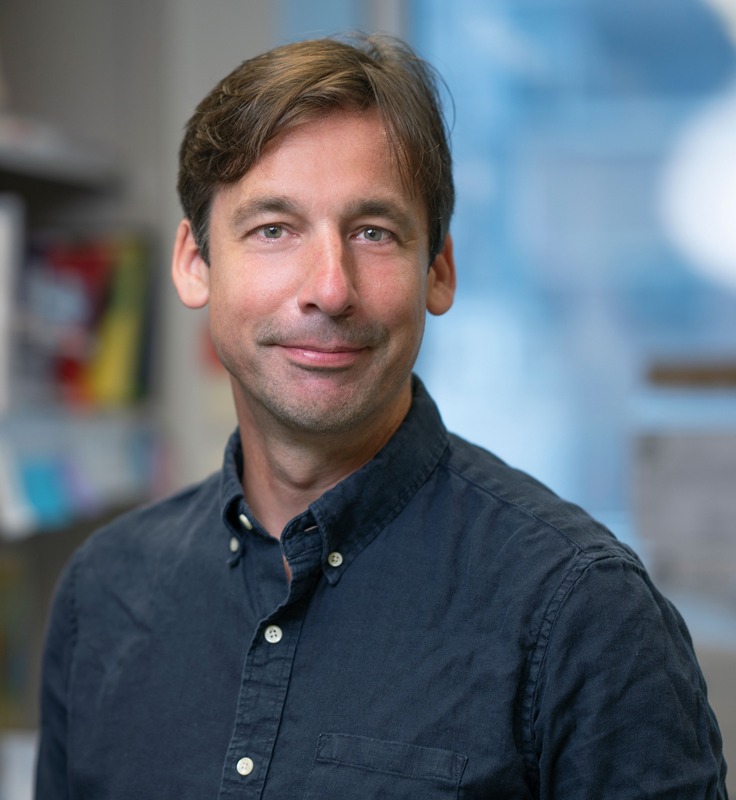
Research
Human cells are microscopically small, yet each cell contains a staggering 2 meters of genomic DNA (~ 6 billion base pairs) that have to be copied with high fidelity every time a cell divides to ensure the faithful transmission of the genetic information from one generation to the next. This essential process is called DNA replication and is mediated by large multi-subunit protein complexes, termed replisomes. Mistakes made during DNA replication can result in genome instability and mutations associated with many diseases, including developmental disorders and cancer.
Complete and accurate chromosome replication is an inherently challenging task due to the sheer size of our genome alone. This is further exacerbated by the fact that chromosomal DNA is tightly associated with a plethora of protein complexes that package the DNA into a compact chromatin structure and perform diverse DNA metabolic functions. Moreover, replisomes have to contend with diverse obstacles in the DNA template itself, such as DNA damage or non-canonical DNA secondary structures that challenge the normal progression of replication forks.
We aim to understand how replisomes navigate this complex chromatin environment and cope with the diversity of obstacles in their path. To this end, we study the structure, dynamics and regulation of yeast and human replisomes reconstituted from purified proteins. We are particularly interested in utilizing these systems to characterize the molecular basis of naturally occurring replication fork impediments and the mechanisms and pathways that allow cells to complete DNA replication when forks stall. Many cancer drugs target the cellular DNA replication and repair machineries to inhibit the uncontrolled growth of tumor cells. Our work may thus provide a basis for the identification of novel cancer therapeutic targets.
Figure 1: A pair of replication forks is established at each replication origin. The subsequent progression of replication forks is challenged by obstacles such as RNA polymerases and unusual DNA secondary structures.

Figure 2: Cryo-EM structure of the replicative DNA helicase from yeast, CMG.

Current Projects:
- Replication stress mechanisms
- Programmed replication fork barriers
- Cryo-EM analysis of replisomes
- Chromatin replication
- DNA damage checkpoint signaling
Bio
Dirk Remus was awarded his Ph.D. from the University of Heidelberg, Germany, in 2003. During his Ph.D. he worked with Prof. Michael R. Botchan at the University of California, Berkeley. He performed his post-doctoral research with Dr. John Diffley at Cancer Research UK’s Clare Hall Laboratories in London, UK, which is now part of the Francis Crick Institute. In 2010, Dirk Remus established his laboratory in the Molecular Biology Program of Sloan Kettering Institute. He was promoted to Associate Member in 2016 and to Full Member in 2020.
Distinctions:
- Long-term fellow, EMBO (2006)
- Louis V. Gerstner, Jr. Young Investigator Award, Memorial Sloan Kettering Cancer Center (2011)
Selected Publications:
Kumar, C., and Remus, D. (2023). Looping out of control: R-loops in transcription-replication conflict. Chromosoma. https://doi.org/10.1007/s00412-023-00804-8.
Castaneda, J.C., Schrecker, M., Remus, D.*, and Hite, R.K.* (2022). Mechanisms of loading and release of the 9-1-1 checkpoint clamp. Nat Struct Mol Biol 29, 369-375. https://doi.org/10.1038/s41594-022-00741-7.
Kumar, C., Batra, S., Griffith, J.D., and Remus, D. (2021). The interplay of RNA:DNA hybrid structure and G-quadruplexes determines the outcome of R-loop-replisome collisions. Elife 10. https://doi.org/10.7554/eLife.72286.
Devbhandari, S., and Remus, D. (2020). Rad53 limits CMG helicase uncoupling from DNA synthesis at replication forks. Nat Struct Mol Biol 27, 461-471. https://doi.org/10.1038/s41594-020-0407-7.
Abd Wahab, S., and Remus, D. (2020). Antagonistic control of DDK binding to licensed replication origins by Mcm2 and Rad53. Elife 9. https://doi.org/10.7554/eLife.58571.
